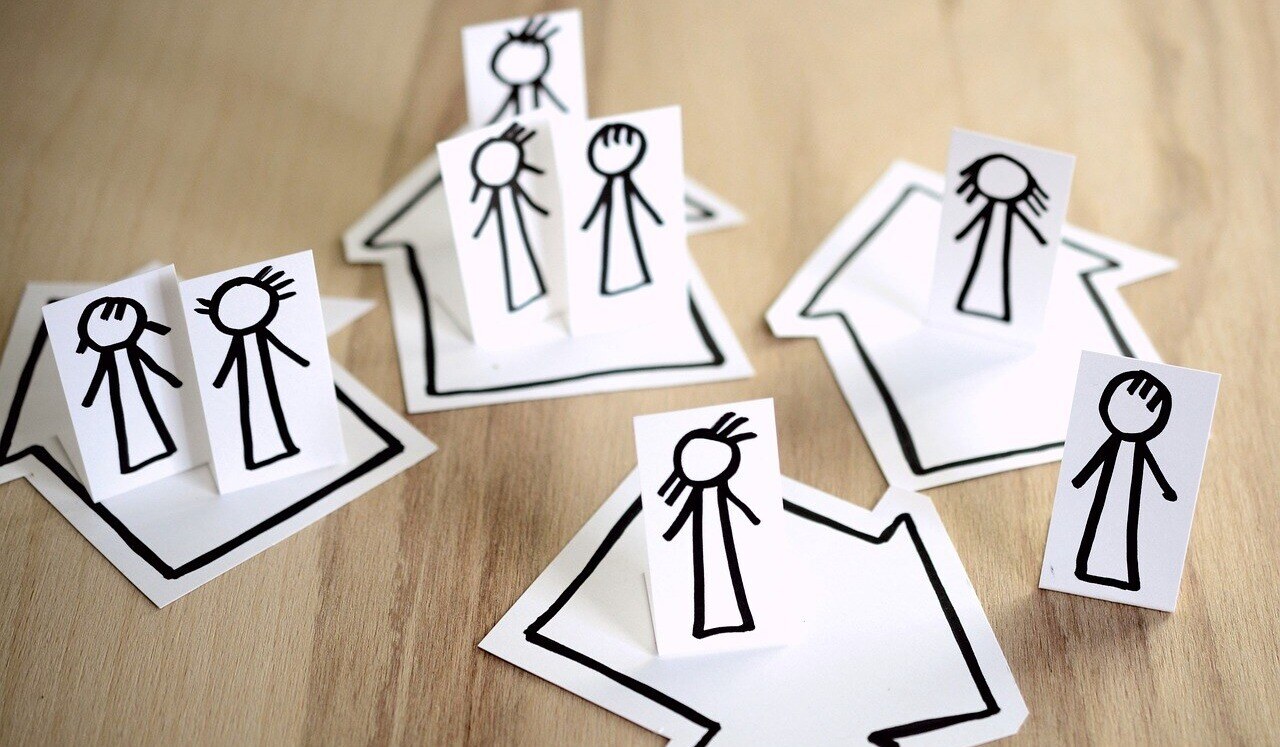The holidays are looming, and this year, they’re following an emotionally charged election. Many of my clients and friends are already wrestling with questions about what this holiday season might look like. Should traditions be upheld? Can I break free from expectations? Are family the best people with whom to spend this time? The pressure to conform is palpable, both from our own minds and the voices of others. For those who feel disconnected from family, the weight of societal norms – the idea that “blood is thicker than water” – can be particularly heavy.
What if blood isn't thicker than water?
The holidays are often portrayed as a time of love, joy, peace, and togetherness; however, many people would not describe their family togetherness in such pleasant terms. Families are not made up of homogenous humans, and for those family members who feel as if their innermost values are in conflict with the values of their family, spending time together can be stressful - even while sometimes being worth it! The most recent election may have had the effect of almost turning up the volume on these differences and difficulties.
I see it all over - people lamenting that political differences cannot simply be handled by "agree to disagree," while others attempt to explain that these differences are directly related to morals and values and, as such, not open to simple disagreement. Some people have chosen to remove themselves from their family interactions and traditions as a way of conserving some of their energy and protecting their well-being. There are other families where I have seen them handle one another and disagreements with love and care. There's no one right answer. No one right way to do family.
Let's look at some examples where blood may not be thicker than water.
-
When family relationships are toxic.
- I often think of these types of relationships in a very literal way (hello, Autism). Toxic family systems are those wherein, like literal toxins when they are consumed, exposure is harmful (and potentially deadly in some extreme cases). Toxins can take many forms, from abuse and neglect to issues like constant conflict and inconsistency. We know from the research that toxic family systems affect the development of our central nervous systems, impacting our very brain structures, and therefore our function, stress response, and coping. There are direct links from toxic stress to later negative physical and behavioral health outcomes, in addition to literally shortening our lifespan. Self-preservation may mean distancing from these types of people, even if they are family.
-
When bonds to non-family members are stronger than family bonds.
- There are so many ways I see this happen, including the natural developmental changes that take place in later adolescence and early adulthood when social and committed relationships (like with partners) become more important. When spending more time with other people outside of the family, those relationships can surpass the strength of family relationships. I hear clients talk about their "chosen family," and this is such a great example of this concept. Relationships that happen outside of family happen because of mutual investment and caring. It is likely they are built on shared interests and beliefs. The amount of time we spend with these folks and the intimacy of being chosen rather than birthed-into can cause them to feel more special. This is normal!
Additionally, entering adulthood can also mean having large geographical distances between family members, and this can cause a decrease in the commitment between them. In light of our current economic reality, travel costs are out of reach for most people.
This has been an impact in my own family relationships. Living in south Louisiana, most of my own family is one (or usually more like three) plane ride(s) away, and that means there is a natural emotional and psychological distance between myself and my own family. I spend more time and physical space with friends and my immediate family. For those fellow non-native south Louisianians, it can feel strange (and at times sad) to see born-and-raised Louisianians have so much family within the same city and state. It makes sense that some of those feelings would show up during the holidays, too.
-
When values and beliefs differ.
- This is one area where I think much of the discourse I am seeing online and hearing about in the office is coming from. For many people it is confusing to consider the years of shared space and influence of family, only to see in later adolescence or adulthood that these people who are so similar in so many ways can believe and behave so differently from yourself.
I could truly write a novel about this (and have written a few different blogs touching on some of these topics that will be linked in relevant places of this section, in fact), but here are some examples that I see both in myself, my friends, and in the stories of clients who come through my therapy space.
Some of the adult clients who grew up in Christian homes and were instructed on the importance of being Christ-like and seeking the Fruit of the Spirit really took these lessons to heart. In the light of the past several elections, they have been surprised and saddened to see that the Churches of their youth and the religious leaders (in and out of their family) seem to abandon these traits and beliefs in preference of a religious authoritarian movement.
Some clients have clarified their chosen values through their childhood and adolescence and strive to be intentional with these values in ways that seem dissimilar to their other family members. I heard this described once as a result of neurodivergence wherein there are different cognitive processes involved in decision making. For example, it has been proposed that Autists process from a bottom-up style, starting from a foundation of their values. Bottom-up processing is slower and deliberate, tends to be more resilient to persuasion techniques, and sometimes means that Autists will make choices that may not benefit them in favor of benefitting others. Neurotypical cognitive styles tend to be top-down, meaning that they are less focused on small details and tend to use cognitive short-cuts to get to their decisions. This thinking style is often faster and less effortful, and is often guided by a present-moment assessment of self need in addition to values, meaning that they are more likely to make decisions that benefit themselves (in addition to or sometimes at the cost of others).
Neither cognitive style is right or wrong, but it does impact decision making around things like morality and voting. Autistic individuals may prioritize long-term, systemic change (e.g., dismantling systems of oppression), while neurotypical individuals may focus on immediate, tangible benefits (e.g., lowering grocery prices). Additionally, Autists are known to struggle with what is called "black and white thinking," which is a rigidity in thinking and decision making. For example, believing that decisions, like voting, should be based on the most core values, like kindness and equity, at all times. Period. Rigidity in thinking can come at a cost.
-
When there are differences in personal growth.
- This is talked about so often during graduate school mental health programs as a sort of warning. When one partner/family member is being intentional about growth and improvement, it's not difficult for them to "outgrow" or grow in a different direction than their partner/family. Marriages can struggle and even end. Relationships between parents and adult children can struggle in similar ways.
The ideal relationship would be one in which each person is committed to and enthusiastic about the growth of the other, and when that happens in family, it's really something powerful to behold. I have seen family systems rocked and family curses/generational trauma healed in incredible ways when the whole system is engaged and committed.
When only one member of a family is committed to growth and healing, it can sometimes feel like an attack on a family system that is clinging to tradition (whether healthy or not). Often the individual who is growing and changing begins to feel and be accused of being a trouble-maker. The black sheep. The lost cause. I often think of the metaphor of crabs in a bucket in these situations with clients. When one crab gets so close to escaping the bucket, the other crabs don't join together to support the escape of the one (and the possibility of their own freedom), they grab ahold and pull that crab back down.
It's my hope as an eternal optimist, therapist, and human being that no human is a lost cause. No family is a lost cause. Growth and healing can happen at any time, so it's always my hope that families feeling rejected, blamed, or shut away would find a way to come back together. In the meantime, supporting the growth of the one is something I'm so honored to do.
A Way Forward
So, what does this all mean for the upcoming holiday season? It means that you have the power to choose what kind of holiday you want to have. You can choose to engage in family traditions that bring you joy and peace, or you can choose to create new traditions that align with your values. You can choose to spend time with loved ones who uplift and support you, or you can choose to prioritize self-care and solitude. You can choose to engage with family through the stress and love them where they are.
Self-compassion and empathy are essential tools for navigating any kind of difficult social experience. Here are some specific tips for managing your own path this holiday season (and beyond).
- Be kind to yourself. If you haven't already discovered and implemented a system of self-care (not just the "take a bubble bath" kind - the real, powerful kind), now is the time to do it. Allow the shoulds to come and go, like the weather, and explore what else might be there in those tough moments.
- Set boundaries. For many people, we have been taught that setting boundaries is selfish and harmful to other people. It can feel impossible to nail down a specific boundary that would be helpful, let alone actually set that boundary! Explore boundary setting with a therapist and/or someone you trust.
- Say no, even when you're afraid. Use the resources available to you to be able to say no in a way that feels safe and will also be effective. I know people who live by the notion "'no.' is a complete sentence" with their whole chest, and I admire their boldness. Other folks prefer a subtle approach, sometimes saying no by being sick (or "sick"), burnt out, or otherwise busy. There's no right or wrong way to do this, either. And when it feels wrong, go back to step one and consider how you might increase the kindness you are showing yourself.
Focusing on your own well-being is not selfish or wrong, and it’s okay to prioritize your needs, even during the holidays. If you could use support with any of the concepts in this blog, feel free to reach out.




